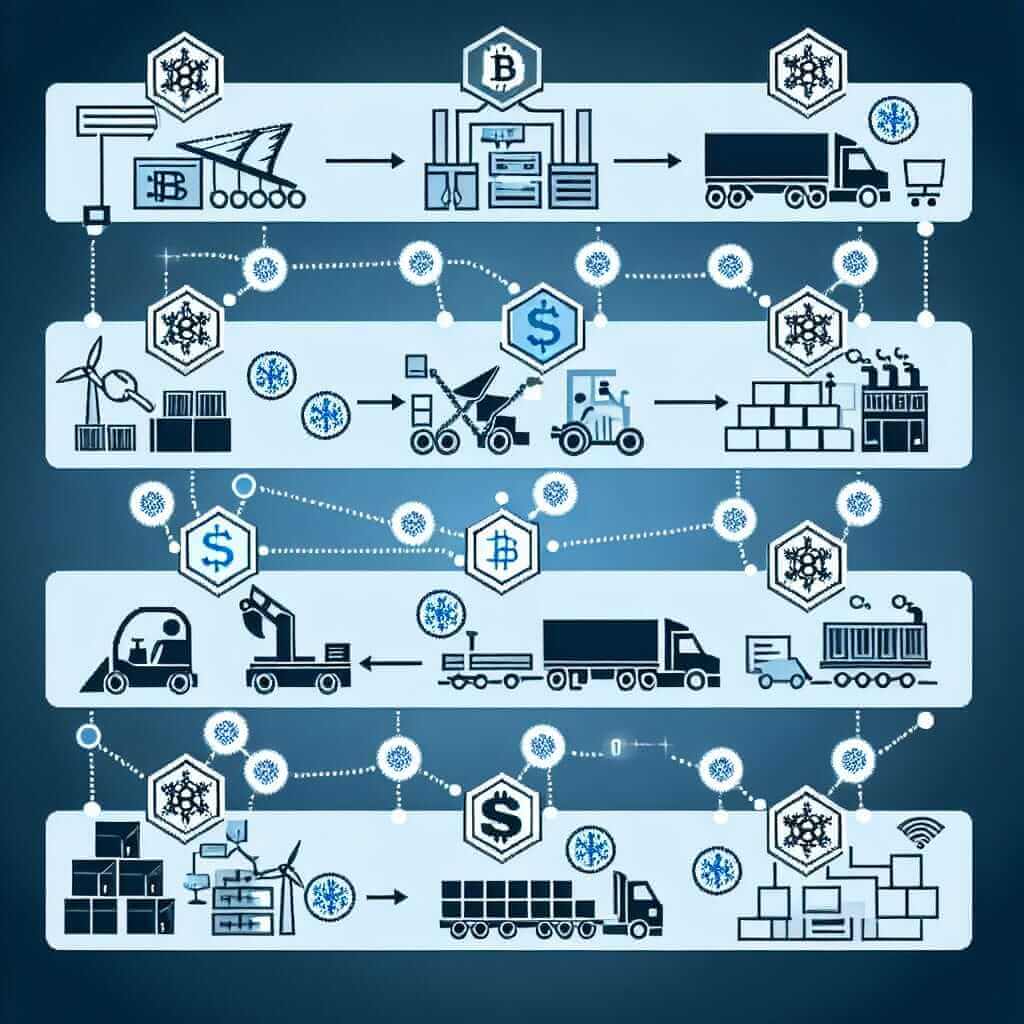The IELTS Reading section tests your ability to read and understand various types of texts. This can include articles, reports, or essays that you might find in a profession or academic setting. One of the increasingly common topics in recent years has been technology’s impact on various industries. Given the modern world’s rapid technological advances, it’s highly plausible that a topic like “How is blockchain technology transforming global logistics?” might appear in an upcoming IELTS exam.
Nội dung bài viết
In this article, we’ll explore how blockchain technology is revolutionizing global logistics. This analysis serves two purposes: providing you with valuable content knowledge and offering a sample IELTS Reading practice test to fine-tune your skills.
IELTS Reading Practice Test
Text: How is Blockchain Technology Transforming Global Logistics?
Blockchain technology, initially created to support digital currencies like Bitcoin, is steadily making its mark across various industries, including global logistics. By incorporating blockchain, companies can improve transparency, traceability, and efficiency in their supply chains.
First, blockchain enhances transparency by providing an immutable ledger of all transactions. Each entry, or “block,” is linked to the previous one, creating an unchangeable chain. This feature is particularly beneficial in logistics, where multiple parties—such as manufacturers, suppliers, and retailers—need to access shared data. The immutable nature of blockchain ensures that no one can alter records without detection.
Second, blockchain improves traceability. For example, when a product malfunctions, companies must be able to trace its origin quickly. RFID (radio-frequency identification) tags enabled with blockchain can track the movement of goods from the manufacturer to the end consumer. With every movement recorded in real-time, both companies and consumers benefit from increased credibility and accountability.

Third, blockchain minimizes human error and fraud. Traditional logistics systems often involve multiple intermediaries and paperwork, making them susceptible to mistakes and deliberate manipulation. With blockchain, transactions are automated and verified through smart contracts, removing the need for manual oversight. These smart contracts are self-executing contracts with the agreement terms directly written into code, significantly reducing the chances of fraud.
Lastly, blockchain can enhance the efficiency of logistics operations. Paper-based processes can delay shipments and incur additional costs. Automated blockchain systems streamline procedures like customs declarations and payments, leading to faster delivery times and reduced expenses.
Overall, blockchain offers a multi-faceted approach to overcoming some of the longstanding challenges in global logistics. As technology continues to evolve, its role in logistics is likely to expand, providing even greater efficiencies and capabilities.
Questions
Multiple Choice
-
What is the primary benefit of using blockchain for transparency in logistics?
a. It reduces costs.
b. It provides an immutable ledger.
c. It minimizes paperwork.
d. It speeds up delivery times. -
How does blockchain improve traceability in logistics?
a. Through automated payments.
b. By using RFID tags.
c. By reducing human error.
d. Through paperwork reduction.
True/False/Not Given
- Blockchain technology was initially created to support supply chain logistics.
- Smart contracts are self-executing contracts built into blockchain technology.
- Traditional logistics systems are less susceptible to fraud than blockchain-based systems.
Summary Completion
Complete the summary below with words from the text:
Blockchain technology is revolutionizing global logistics by enhancing (6) __ through its immutable ledger, improving (7) __ with RFID tags, and minimizing human error and (8) __ through automated smart contracts. Additionally, it (9) __ the efficiency of logistics operations by automating processes that would traditionally require (10) __.
Answer Key
- b. It provides an immutable ledger.
- b. By using RFID tags.
- False. (Blockchain technology was initially created to support digital currencies like Bitcoin.)
- True.
- False. (Traditional logistics systems are more susceptible to fraud.)
- transparency
- traceability
- fraud
- enhances
- paperwork
Lesson Learned
Common Mistakes:
- Misunderstanding: Misinterpretation of technical terms like “immutable ledger” or “smart contracts.”
- Inattention to Detail: Failing to notice key details that confirm whether a statement is true or false.
- Overlooking Context: Not fully understanding the role of RFID tags or other supporting technologies mentioned.
Vocabulary
-
Immutable (adj.)
- Pronunciation: /ɪˈmjuː.tə.bəl/
- Meaning: Unchanging over time or unable to be changed.
- Example: Blockchain’s immutable ledger records all transactions permanently.
-
Traceability (noun)
- Pronunciation: /ˈtreɪ.səˌbɪl.ɪ.ti/
- Meaning: The ability to verify the history, location, or application of an item through recorded data.
- Example: RFID tags enhance traceability within the supply chain.
-
Smart Contracts (noun)
- Pronunciation: /smɑːrt ˈkɒn.trækt/
- Meaning: Self-executing contracts with the terms of the agreement directly written into code.
- Example: Smart contracts automate transaction verification.
Grammar Point
Present Perfect Tense
- Structure: Subject + have/has + past participle
- Usage: To describe actions that happened at an unspecified time before now.
- Example: “Blockchain technology has revolutionized global logistics.”
Advice for High Scores in IELTS Reading
- Practice Regularly: Make reading a daily habit. Use diverse materials such as articles, journals, and reports.
- Expand Your Vocabulary: Learn new words and phrases regularly.
- Work on Comprehension: Focus on understanding the main ideas and supporting details in articles.
- Take Mock Tests: Simulate test conditions to improve time management and accuracy.
- Review Errors: Analyze your mistakes and learn from them.